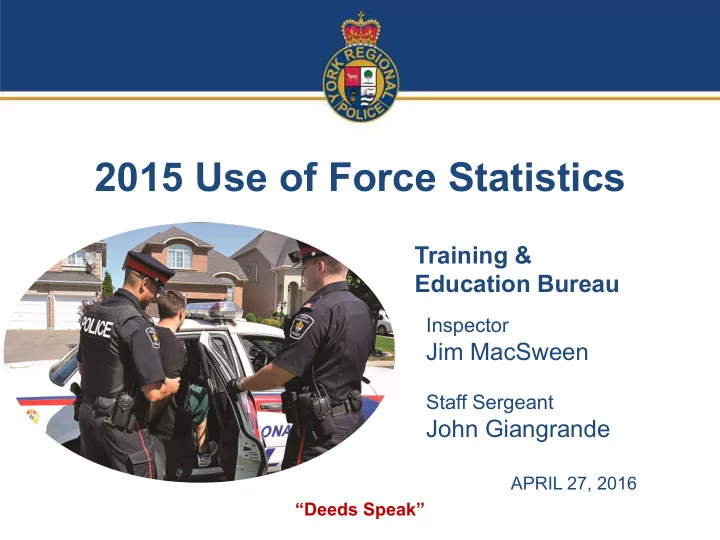

2015 Use of Force Statistics Training & Education Bureau Inspector Jim MacSween Staff Sergeant John Giangrande APRIL 27, 2016 “Deeds Speak”
Presentation Overview • Use of force authorities • Ontario Use of Force Model • 2015 trends • Questions and answers
Police Authority • The Police Services Act (O. Reg. 926s.14.5) • Reasons to use force: • to protect life • preserve the peace • prevent crimes • maintain order • apprehend suspects
Ontario Use of Force Model The officer continually assesses the situation and selects the most reasonable option relative to those circumstances as perceived at that point in time
Use of Force Reported Of the 239,017 calls for service 293 incidents or 0.12% required a report
2015 Use of Force Trends • Incidents Requiring Report • Number of Reports • Discharge Firearms • Display Firearms • Suspects Armed with Weapon • Conducted Energy Weapon Use • Empty Hand – Soft • Injuries
Firearms Draw & Display Firearms • weapons calls • silent 911 calls • robbery calls • break and enter calls • armed and suspicious person calls • high risk search warrants • high risk vehicle stops
Discharge Firearms • 29 incidents in 2014 • 81 incidents in 2015 • Dispatch of Animals – humane & public safety Increase can be attributed to the outbreak of canine distemper in the wildlife population and the police are the only ones responding *Toronto Star 29Nov15
Subjects Armed with a Weapon • 72 in 2015 • 56 in 2014 Most common weapons: • Edged Weapons • F irearms
Conducted Energy Weapon Use of CEW • 65 in 2015 • 21 in 2014 Discharge • 33 in 2015 Display of CEW • 32 in 2015 • not required to report in 2014 • Increased presence as a de-escalation tool • Increased encounters with assaultive subjects • Increased encounters with edged weapons
Injuries Subjects: • 64 in 2015 • 28 in 2014 Officers: • 4 in 2015 • 2 in 2014 All injuries were minor in nature and EMS were engaged as a medical precaution .
What Are We Doing? • Continued De-escalation Scenario Based Training • Crisis Intervention Training • Mindfulness Based Resiliency Training • Continued rollout of CEW to front line members
Thank you Questions?
Recommend
More recommend